GRAD NEWS | UNDERGRAD NEWS | FACULTY NEWS | ALUMNI SPOTLIGHT | EVENTS | OPPORTUNITIES & DEADLINES
CHAIR’S LETTER: Winter 2022
Dear Feminist Studies Community,
I hope all of you had some time to decompress and recharge over the holiday season! This was a much-needed break, albeit very short. We have been through a lot over the past two years, and it looks like COVID-19 is not quite done with us yet. I would like to take a moment to acknowledge all those whom we have lost to the pandemic, as well as all the opportunities we missed for meeting new people, spending time with family and friends, or travelling and exploring the world.
There is also hopeful news. In spite of the fact that Feminist Studies courses continue to be offered remotely for now, our graduate and undergraduate student communities continue to thrive, with occasional meetings for undergrad and grad students to discuss important issues in feminist studies, have fun and enjoy some snacks provided by the department.
In other happy news, a year ago in the first FMST Newsletter of 2021, we introduced Five Questions with a Feminist, a series of interviews with FMST alumni. Our spotlight in this issue is particularly inspiring and timely.
Abyan Mama-Farah is a 2017 UCSC graduate with a double major in Feminist Studies and Biology. Abyan is currently in her second year of medical school at UC San Diego School of Medicine. In the midst of our current reality, it's good to know that passionate people like Abyan are in the world, driven to learn more about infectious diseases and applying their feminist perspective to the broader mission of health equity. Abyan is an inspiring example of how a feminist studies education imparts a critical perspective on the world, no matter what profession our majors ultimately pursue.
Read FMST Professor Gina Dent's conversation with Abyan in the newsletter, or view it, along with previous Five Questions with a Feminist alum interviews, on our FMST YouTube channel.
As you’ll read in this newsletter, the FMST community continues to be a vibrant one, be it undergraduate or graduate students, faculty or alumni. We are excited to share everyone’s amazing accomplishments.
I wish all of you a hopeful, successful, and happy new year in 2022! May it be kind to the world, and may we continue to be kind to each other.
Zsuzsi Abrams
Interim Chair, Feminist Studies / Professor, Languages & Applied Linguistics, UCSC
GRADUATE STUDENT NEWS
Update on Afghan Visiting Scholar at FMST
Following the 2021 Taliban takeover in Afghanistan, UCSC launched the Afghanistan Visiting Scholars Emergency Support Fund, a crowdfunding effort to bring three at-risk Afghan thought leaders and their families to UC Santa Cruz with Visiting Scholar appointments. The campaign raised significant funds in support of these scholars, who were identified with the help of Halima Kazem-Stojanovic – an Afghan-American FMST grad student whose research focuses on women in Afghanistan.
The FMST department, in partnership with the Peggy and Jack Baskin Foundation Presidential Chair in Feminist Studies, looked forward to hosting one Afghani scholar and her family to campus. Unfortunately, due to visa issues and the complexity of her family situation in and outside of Afghanistan, our scholar’s arrival had to be postponed for now. We will share more information as we receive it.
More info on the campaign here. The public can still make a donation on UCSC’s online giving platform.
THI profiles FMST grad student Kaiya Gordon
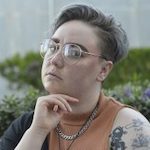 In October, The Humanities Institute profiled FMST grad student Kaiya Gordon, discussing their THI Summer Public Fellowship.
In October, The Humanities Institute profiled FMST grad student Kaiya Gordon, discussing their THI Summer Public Fellowship.
Kaiya spent Summer 2021 working with the GLBT Historical Society in San Francisco. Gordon’s research explores trans representations in media, literature, art, and sites of historical memory like archives and museums, so this was a perfect assignment for them. “My work as a THI Public Fellow certainly opened up new avenues of Inquiry,” said Kaiya.
“Historical sites like museums are loci of colonial projects, and represent what we are working against,” they said. “When we look at such sites, it’s clear who is valued and who isn’t; whose history is saved (and why!) and whose histories are transformed by the State to further the status quo. I think that community archives, and other humanities projects, can work against this colonial, white supremacist, hetero and cisnormative logic, and create spaces for material history which can be passed down through generations.”
Read the full interview with Kaiya here.
UNDERGRADUATE STUDENT NEWS
Undergrads get together for in-person study sessions
Feminist Studies undergrad reps Yali Bitan and Nicole Moroles, along with FMST grad student Emily Padilla, hosted two study sessions in the weeks leading up to Fall finals. It was great to see folks coming together again in-person, and hopefully we’ll be able to do it again soon!!
Keep an eye on your email and the FMST Instagram for info on Undergrad get-togethers planned for Winter quarter, and come on out!
In the meantime, Yali and Nicole continue to attend monthly FMST faculty meetings to share undergrad concerns and issues. If you have something you want to say, let Yali and/or Nicole know and they’ll pass it along…
Congratulations to our 2021-22 Baskin transfer scholarship awardees!
We are very pleased to announce that three Feminist Studies transfer students have received a $2500 scholarship from the Baskin Transfers FMST Scholars Program. The Baskin Transfers scholarship is open to FMST majors transferring from Cabrillo College, De Anza College, or Monterey Peninsula College.
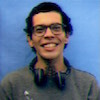 Ronald Gunna is a third-year transfer from Cabrillo, double majoring in FMST and CRES. Ronald says he enrolled in his first feminist course accidentally, but has continued pursuing the study with the hope of making his mother proud. Ronald was also recently selected for a 2021-22 Public Fellowship by The Humanities Institute. For his THI fellowship, he will be an editorial intern at The American Prospect. Double congrats, Ronald!
Ronald Gunna is a third-year transfer from Cabrillo, double majoring in FMST and CRES. Ronald says he enrolled in his first feminist course accidentally, but has continued pursuing the study with the hope of making his mother proud. Ronald was also recently selected for a 2021-22 Public Fellowship by The Humanities Institute. For his THI fellowship, he will be an editorial intern at The American Prospect. Double congrats, Ronald!
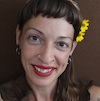 Maria R. Hele (she/her) is a junior transfer FMST/CRES double major interested in exploring the experience of motherhood through the lenses of intersectional feminism and dynamics of power across the political and the personal. During her time at UCSC, Maria intends to add to the critical discourse and utilize art and storytelling as mediums for visualizing past, present, and future realities.
Maria R. Hele (she/her) is a junior transfer FMST/CRES double major interested in exploring the experience of motherhood through the lenses of intersectional feminism and dynamics of power across the political and the personal. During her time at UCSC, Maria intends to add to the critical discourse and utilize art and storytelling as mediums for visualizing past, present, and future realities.
 Ellis Murphy is a Feminist Studies major minoring in Anthropology in hopes to gain an intersectional perspective and understanding of the world and its people from all walks of life. “I want my time at university to contribute just as much to my personal development as to my academic life and future professional career,” says Ellis.
Ellis Murphy is a Feminist Studies major minoring in Anthropology in hopes to gain an intersectional perspective and understanding of the world and its people from all walks of life. “I want my time at university to contribute just as much to my personal development as to my academic life and future professional career,” says Ellis.
Congratulations to our 2021-22 cohort of Baskin transfer scholarship recipients!
Considering grad school?
If you’re thinking of pursuing an advanced degree after you earn your B.A., keep your eyes open for news about a workshop we're planning for January 21 at 11am PT, hosted by FMST grad student Taylor Wondergem.
Most grad school deadlines are in December or January, but it’s a good idea to start planning about a year before applications are due. The workshop will discuss how to develop your research experience, what grad admissions look for in their applicants, tips for preparing a strong application, and much more.
There's also a Prepping for Grad School workshop series being hosted by Pathways to Research (P2R) mentors for EOP students in Winter quarter. See the "FMST Events" section below for more info.
FACULTY NEWS
FMST professors unveil new books
Congratulations to two Feminist Studies professors on the publication of their most recent books!
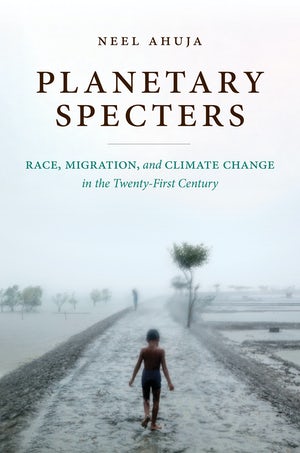 The new book by Professor Neel Ahuja – Planetary Specters: Race, Migration, and Climate Change in the Twenty-First Century (UNC Press) – tracks the figure of the climate refugee in public media and policy over the past decade, arguing that journalists, security experts, politicians, and nongovernmental organizations have often oversimplified climate change and obfuscated the processes that drive mass migration. To understand the systemic reasons for displacement, Ahuja argues, it is necessary to reframe climate disaster as interlinked with the history of capitalism and the global politics of race, wherein racist presumptions about agrarian underdevelopment and Indigenous knowledge mask how financial, development, migration, and climate adaptation policies reproduce growing inequalities.
The new book by Professor Neel Ahuja – Planetary Specters: Race, Migration, and Climate Change in the Twenty-First Century (UNC Press) – tracks the figure of the climate refugee in public media and policy over the past decade, arguing that journalists, security experts, politicians, and nongovernmental organizations have often oversimplified climate change and obfuscated the processes that drive mass migration. To understand the systemic reasons for displacement, Ahuja argues, it is necessary to reframe climate disaster as interlinked with the history of capitalism and the global politics of race, wherein racist presumptions about agrarian underdevelopment and Indigenous knowledge mask how financial, development, migration, and climate adaptation policies reproduce growing inequalities.
Drawing on the work of Cedric Robinson and theories of racial capitalism, Ahuja considers how the oil industry transformed the economic and geopolitical processes that lead to displacement. From South Asia to the Persian Gulf, Europe, and North America, Ahuja studies how Asian trade, finance, and labor connections have changed the nature of race, borders, warfare, and capitalism since the 1970s. Ultimately, Ahuja argues that only by reckoning with how climate change emerges out of longer histories of race, colonialism, and capitalism can we begin to build a sustainable and just future for those most affected by environmental change.
Scientific American wrote: "As the planet continues hurtling toward disaster at breakneck speed, Ahuja presents a convincing framework for understanding environmental racism."
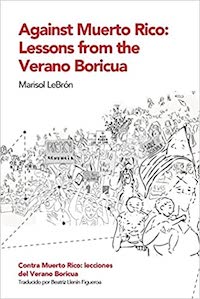 Associate Professor Marisol LeBrón celebrated the publication of her book, Against Muerto Rico: Lessons from the Verano Boricua (Contra Muerto Rico: lecciones del Verano Boricua). The bilingual publication is part of the reVolucionA series published by Editora Educación Emergente.
Associate Professor Marisol LeBrón celebrated the publication of her book, Against Muerto Rico: Lessons from the Verano Boricua (Contra Muerto Rico: lecciones del Verano Boricua). The bilingual publication is part of the reVolucionA series published by Editora Educación Emergente.
Against Muerto Rico approaches the Verano Boricua 2019 – the largest protests in Puerto’s Rico’s modern history, when the populace mobilized to force the resignation of governor Ricardo Rosselló – from a sociological standpoint. LeBrón explores what she considers the six most significant political lessons to be garnered from the rebellion for the ongoing struggle against the forces of death in Puerto Rico. These lessons are: (1) the struggle must be intersectional; (2) the criollo elite are a murderous class; (3) debt is death, protest is life; (4) protests are sites of pleasure; (5) la policía ≠ el pueblo; and (6) the diaspora must be a part of the struggle for Puerto Rico’s future.
Professor LeBrón’s latest book follows the 2019 publication of Policing Life and Death: Race, Violence, and Resistance in Puerto Rico, which traces the rise of punitive governance in Puerto Rico through the 20th Century to the present.
Kudos to Professors Ahuja and LeBrón!
Anjali Arondekar discusses caste discrimination in KCBS interview
On November 19, Professor Anjali Arondekar, co-director of UCSC’s Center for South Asian Studies, was interviewed on KCBS Radio about UC Davis adding caste discrimination to its anti-discrimination policy, one of the first universities in the country to do so.
“This is a landmark in many ways,” said Prof. Arondekar. “Caste is really about labor segmentation and sustained inequality through the years — millenniums, really. And caste discrimination isn’t something that just belongs in India, but something that travels with the millions of people who inhabit the South Asian disaporas.”
Listen to the interview here.
FMST Faculty Awards, Publications, and Conferences
Katie Keliiaa was profiled in a recent THI spotlight, which focused on her book project titled Unsettling Domesticity: Native Women and 20th-Century Federal Indian Policy in the San Francisco Bay Area. Read the interview here.
Jenny Kelly received a Faculty Public Humanities, Digital, and Community-Engaged Research Fellowship for her project, "Detours: A Decolonial Guide to Palestine," awarded by the UCSC Humanities Division and The Humanities Institute (THI).
Jenny also participated and presented her research at several events last fall:
“Witnesses in Palestine: Imperfect Analogies, and Refusals to Perform,” Middle East Studies Association, December 2021.
Invited Roundtable Participant: “Palestine: Resurgent and Emergent Solidarities,” American Anthropological Association Annual Meeting, November 2021.
Invited Participant, Book Event: “Q&A: Voices from Queer Asian North America,” with co-editors Martin Manalansan, Alice Hom, and Kale Batingue Fajardo and contributors, November 2021.
“Itineraries under Duress: Tours Across an Occupied City,” National Women’s Studies Association, November 2021.
“Itineraries under Duress: Tours Across an Occupied City,” American Studies Association Annual Meeting, October 2021.
Marisol LeBrón had an article, “Policing Coraje in the Colony: Toward a Decolonial Feminist Politics of Rage in Puerto Rico,” published in the Summer 2021 issue of Signs: Journal of Women in Culture & Society. She was recently named an editor at Society & Space and is an executive editor at NACLA (North American Congress on Latin America).
Madhavi Murty received a Faculty Research Fellowship for her project, tentatively titled "Sonic India: Sound and the Making of Folk Nationalisms," awarded by the UCSC Humanities Division and The Humanities Institute (THI).
ALUMNI SPOTLIGHT – Five Questions with a Feminist
Abyan Mama-Farah, M.D. candidate, UC San Diego School of Medicine | Class of 2017
The Five Questions with a Feminist interview series spotlights former FMST majors who have gone on to do great things. Visit our YouTube channel to view Professor Gina Dent’s interview with FMST alum Abyan Mama-Farah. Below is an edited version of their conversation.
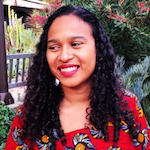 A native of Nigeria, Abyan Mama-Farah graduated with honors from UCSC in 2017 as a double major, earning a B.A. in Feminist Studies with a concentration in Science & Technology and a B.S. in Biology. In her senior year, she was a recipient of the Dizikes Undergraduate Award, selected by that year's faculty recipient of the Dizikes Award, Distinguished Professor Emerita Bettina Aptheker. Today, Abyan is in her second year as an M.D. candidate at UC San Diego School of Medicine, working toward her goal of pursuing healthcare in a global context, with special interests in infectious diseases and preventive medicine.
A native of Nigeria, Abyan Mama-Farah graduated with honors from UCSC in 2017 as a double major, earning a B.A. in Feminist Studies with a concentration in Science & Technology and a B.S. in Biology. In her senior year, she was a recipient of the Dizikes Undergraduate Award, selected by that year's faculty recipient of the Dizikes Award, Distinguished Professor Emerita Bettina Aptheker. Today, Abyan is in her second year as an M.D. candidate at UC San Diego School of Medicine, working toward her goal of pursuing healthcare in a global context, with special interests in infectious diseases and preventive medicine.
Hi Abyan. Can you tell us about what you’re doing now?
I am in Medical School at UC San Diego School of Medicine. I'm halfway through my second year, a couple months away from taking the first board exam and starting hospital rotations.
What made you decide to major in Feminist Studies?
My Mom's a feminist studies professor and activist, and I grew up hearing a lot of really grounding and wonderful truths of the world through that lens.
At UCSC I was just a biology major at first. Then I took the Black Diaspora class that you were teaching, and it felt really wonderful to have a place to think analytical thoughts about the science training I was doing. I really appreciated being able to think about society. I loved my science degree classes, but [Feminist Studies] engaged a different part of my brain. By doing the Feminist STS (Science & Technology) major at UCSC, I was able to take a lot of classes, like sociology of medicine and health, that to this day still influence my thoughts on what it means to be a good medical school candidate and what it will mean to be a good doctor. How one can use a lens to make people feel seen as you engage with them one on one, and how one can use that to inspire the different things you do with the degrees you take. I'm really grateful for the way it helped me position myself in the world and understand how what I want to do can be influenced by the steps I take along the way to get there.
Could you talk a little about what made it possible for you to do both degrees at UCSC?
I ended up taking five years to finish my degrees, which was good. It was extra good, too, because I didn't have a super deep science background before starting university. I had been in art school and dabbled in things I thought sounded interesting, but I didn't have years of rigorous training like some people come in with. By doing the feminist studies degree, I was able to only ever take two science classes at a time. Which means that my long-term retention of that material is a bit better. I would work on studying chemistry and biology until I was tired, then switch over to my [feminist studies] papers and readings. Because it's like two different parts of your brain, it allowed me to actually work a bit longer to have two different things that I was doing. And I think it kept me feeling more grounded. It's really easy to get lost in science.
Do you feel that feminist studies influenced you in terms of your professional goals and what kind of medicine you want to practice?
Definitely, 100%. I haven't started the hospital part of my training yet, so until you get into doing the day-to day-practice, you don't really have a full idea. But in making decisions about where I want to go in medicine, how I can impact society is a huge part for me. The most popular specialties for medical training in the United States are orthopedic surgery and dermatology. In orthopedic surgery, you can become part of the top sector in society and make a ridiculous amount of money. In dermatology you can have a really good lifestyle with good earning potential and a lot of free time. But it never occurred to me to think of money and free time in deciding what profession I want to do. I was always really interested in infectious diseases. Even before there was a pandemic, I read a lot of books about sci-fi stuff and pandemics, and Parable of the Sower (by Octavia Butler) is one of my favorite books.
Infectious diseases is the specialty I'm interested in, in part because of the way you can work on the public health and the individual level, and you can also do global health. Not being from the United States, that speaks to me. Other areas interest me, too, like ob gyn where you work with women and can really influence the health of entire societies. Those kinds of thoughts come from my feminist studies training, and from the positionality that I gained and shaped by engaging fully in articulating who I am as a person.
It also really helps me in moments when I need to speak up about something to have had practice. You engage in debate a lot more in social sciences and the humanities, and that's something we need from our doctors – the willingness to be an advocate for your patients. All my favorite doctors training me here have non-science degrees, sometimes in addition to [science degrees] and sometimes instead of. A lot of the best medical schools in the world look for people who have both [types of] degrees, because more and more medical training [programs] are starting to realize that it's really good to have doctors who engage with society and see themselves in society. It’s great that we have so many people who are brilliant at scientific research, but there's a huge place for people who want to engage more socially with medicine. As clinicians and also as advocates for patients’ health on the city, state, national and international level, these things are really, really important. I wouldn't feel as empowered to do them without having engaged intensely in analytical theory at UCSC about what it means to be in this world.
What was your favorite feminist studies course?
It was your Black Diaspora class. I appreciated that class because I learned so much about the world as a whole. And the paper I wrote really allowed me to engage with how medical and scientific history has engaged with women's bodies and, more specifically, black women's bodies. We have a health equity thread at my school and I just had a lecture in our reproductive health block that was all about what I wrote in that paper. It felt really good to see the things that have been really concerning to me since engaging in that work in 2015. I still think about discussions we had in that class. It was small, just eight of us, and I really learned about myself in learning about other people. It was definitely one of my favorite classes.
What do you think was the most important thing you learned as a FMST major?
I think the way I shaped my degree. You get a lot of freedom around how you want to shape your feminist studies degree, much more so than with your science degree. So that was one thing – the freedom to choose what I wanted to learn.
But I think the greatest lesson was that me being a doctor was really, really, really important in the world – as a black woman, as an immigrant from Africa. There were so many moments when I wanted to deviate from that path, especially doing the MCAT. It’s this huge ordeal you face to get into medical school, a horrible exam, and there’s great suffering in your life at that moment.
In those moments where I would feel really low on myself – Is this worth it, am I wasting my time, my parents’ money, all those things, because I worked part time and applied to medical school a couple years after finishing [my undergrad degrees] – the motivation is what gets you in. Your true north is what gets you in. Being able to shore yourself up in those moments where you don't believe in yourself.
There’s a quote by the former surgeon general of the United States (Joycelyn Elders, the first African American US Surgeon General). She went to all state schools and said getting into medical school is about perseverance, not sheer mental skills. It's not about being able to regurgitate 5,000 facts about the human body. It’s about not taking no for an answer and keeping going. I think my true north was shaped a lot by the kinds of thinking I got to do in the feminist studies classroom. Learning about myself, African history, African American history, black history in general. It all made me understand how important it is that people like me do medicine and advocate for the health issues that affect black people around the world and the diaspora.
I'll use the example of sickle cell. There’s this podcast I love called “This podcast will kill you,” and they did a sickle cell episode and contrasted it with cystic fibrosis. Cystic fibrosis is the most common genetic disorder in white Americans and sickle cell is the equivalent for black Americans. And the level of difference in research funding to pursue these two different things is on an order of magnitude on both the governmental and private levels.
Doing research really takes a lot out of someone. So who is called to do what research is often a very personal thing. Having a history of so many doctors being white men and white people in general, there’s often this predominance of [attention to] issues that affect that population. It's really important that people from other communities can also advocate for issues that affect our populations.
That whole spiel is very much a fem studies thing. It's not about living a good life and being really comfortable. It's about how I can maybe help in some way and play my small part in making the world better, even if it's for one individual person, with the kinds of things I can do with this degree. That's a good true north to have, and good motivation when you feel sad and low and down.
And that was shored up by my studies. It's one thing to think, ‘Oh, things are bad,’ but to have read and engaged so much with the deepness and the depth and the depravity of the suffering and to have read the statistics and [books] like Medical Apartheid by Harriet Washington … That’s something I don't know I would have made the time for if I hadn't done a degree in feminist studies, because science degrees can be so all-consuming. So putting myself in a position to have that be part of what determines that I’m ‘doing well.’
There are all sorts of programs where you can do a master's degree while you do your medical degree. One of my classmates wants to get an MBA with his medical degree. He's Native American, and he's going to revolutionize healthcare access for a lot of people with the business skills he gets.
I do think there's a place for those of us who really want to engage in generating the kinds of social technologies necessary for everyone to have health literacy, to also be in medical practice and medical education and all over the place. All of those things – feminist studies. And just teaching me how to talk to people and really see them and to have an understanding of positionality, practice unconditional positive regard and other good things.
You’ve said so much, but is there any last thing you'd like to share with our FMST students?
My parents both raised me to believe that no learning is ever going to do anything but help you in the long run.
As you make your decisions about what you want to do with a feminist studies degree and where you want to go in this world, knowing that the learning you're doing about who you are as a person is going to be some of the most important learning you'll do. And if you can pair that with learning about society, then you're learning how to see other people. To see them with love and hold them in your heart with care, even when they're people you don't like.
A lot of being a doctor is the Hippocratic oath, ‘I will do no harm.’ Yes, I have some rage sometimes when I get frustrated about the various forms of oppression in our world. But I’ve also learned how to see the ways people were maybe mis-educated into some of their beliefs and to have kindness and understanding for that.
There's no bad learning. You're on a good journey, and UCSC is a beautiful place to grow at this stage in your life. Best of luck to all the students out there, and I hope everything you choose to do blooms.
FMST EVENTS AND OTHER EVENTS OF INTEREST
Prepping for Grad School Workshop Series – begins January 27, 11-12:30 am
Pathways to Research (P2R) mentors will be hosting a workshop series on preparing for grad school, open to all EOP students. Workshops will be held virtually and cover four topics: 1) planning a successful junior year; 2) selecting a grad program; 3) writing a personal statement; and 4) networking and discussing your research. Visit bit.ly/UCSCP2R for registration info and workshops dates.
Dissent Lecture Series – Winter 2022
The UCSC Center for South Asian Studies and THI present this year-long lecture series, curated by FMST professor Anjali Arondekar. All lectures are virtual, from 10am to 12 noon PT. Visit csas.ucsc.edu/events to learn more about each event and to register.
- January 21 – Multispecies Distributions in the Epidemic Episteme – Bishnupriya Ghosh, UC Santa Barbara
- February 25 – Caste Fanaticism and Misogyny: The Hate Politics of Internet Hindutva – Meena Kandasamy, anti-caste activist, poet, novelist and translator
UPCOMING DEADLINES
2022-23 Andrew W. Mellon Foundation Predoctoral Awards in Women’s History – Deadline January 15
The two recipients of this award should have a strong interest in women’s and public history and the applications of these fields outside the academy. Functioning as research associates and providing programmatic support for NYHS’s Center for Women’s History, pre-doctoral awardees will assist in the development of content for the Women's History exhibitions, associated educational curriculum, and on-site experiences for students, scholars, and visitors. Must be a currently enrolled PhD student in good standing. Awardees will be in residence part time at the New York Historical Society for one academic year, between September 6, 2022, and August 31, 2023, and will receive a stipend of $20,000 per year. Apply here.
Call for Papers: Humanities Education & Research Association – Deadline January 25, 2022
Proposals for papers, panels, or workshops welcome for the virtual conference, March 2-5, on the theme of “Only Connect” – Sites of Inclusion, Seclusion and Transformative Change and Creativity.” Proposals must be submitted through the conference submission portal on HERA’s website, heraconference.org.
FMST Undergraduate Awards – Deadlines TBD, February/March 2022
Learn more about department awards for FMST undergrads here.
- 21st Century Scholarship – The 21st Century Feminist Scholars endowment supports the pursuits of new and rising scholars in the field of feminist studies. Every year, the department awards two to three scholarships in amounts ranging from $300 to $1,000 to support independent research, research-related travel, or experiential learning.
- Bettina Aptheker Award for Research or Community Service on Sexual, Gendered, and Racial Violence – Bettina Aptheker, Distinguished Professor Emerita of Feminist Studies, is one of UCSC’s legendary professors. A radical feminist, political activist, UCSC alumna, and history scholar with a national reputation, Professor Aptheker has reached over 16,000 students through her classes in the FMST department. In honor of and as an extension of her legacy, Professor Aptheker established an endowment to support students whose research, work, or community service relates to sexual, gendered, and/or racial violence. This $1,000 award rotates every other year between FMST graduate students and undergraduate students.
- Sabrina Greenfield Award – This $3,000 award was established in honor of Feminist Studies major Sabrina Greenfield, whose friends and family wish to acknowledge and remember her life and dedication to social justice. The award is based on academic merit and financial need, and is open to John R. Lewis College FMST majors at the sophomore, junior, or senior level.
Summer Introduction to Undergraduate Research Program – Application opens February 2022
This summer residential program, coordinated by the GANAS Graduate Pathways HSI Initiative, partners Latinx, EOP, and other underrepresented frosh and sophomore students interested in the arts, humanities, and social sciences with a UCSC grad student mentor to learn about undergraduate research, graduate school pathways, and careers in academia. The two-week program runs July 10-22 on the UCSC campus. Housing, meals, and a $600 fellowship will be provided to selected participants. For more information, complete this interest form. An information session will be scheduled in winter quarter.
University of California Humanities Research Institute grants – Deadline February 22
UCHRI primarily funds UC faculty and doctoral students participating in innovative research and projects that engage a variety of disciplines and stakeholders. Note: Most ECHRI grants go through the Office of Sponsored Projects (OSP), which must be notified at least two weeks before the deadline. Upcoming grants:
UCHRI—Multicampus Faculty Working Groups, 2022-23 [Faculty]
UCHRI—Conference Grant [PhD/Faculty]
UCHRI—Multicampus Graduate Student Working Groups, 2022-22 [Faculty]
UCHRI—Short-Term Collaborative Research Residency, 2022–23 [Faculty]
UCHRI—Residential Research Group (RRG): Topic Proposals (Spring 2023 and Fall 2023) [Faculty]
UCHRI—Graduate Student Dissertation Support, 2022-23
UCHRI—Andrew Vincent White and Florence Wales White Graduate Student Scholarship
UCHRI—Living Through Upheaval Grants Program, 2022-23 [Faculty]
UCHRI—Engaging Humanities Grant, 2022–23 [Faculty]
Call for Content: Refract, “Sensing Place” – Deadline February 28, 2022
Refract is a collaborative project founded in 2016 by PhD students in the Visual Studies program at UCSC. For its next volume, Refract invites articles and other media that explore, expand on, and trouble the intersections of ritual, place, and the sensorium. What constitutes ritual and how does it relate to time, place, and the senses? Contributions welcome from graduate students, artists, faculty, and independent scholars across the humanities, including but not limited to visual studies, art history, anthropology, literature, and history. Please complete this submission form. Submission guidelines on the Refract website.

